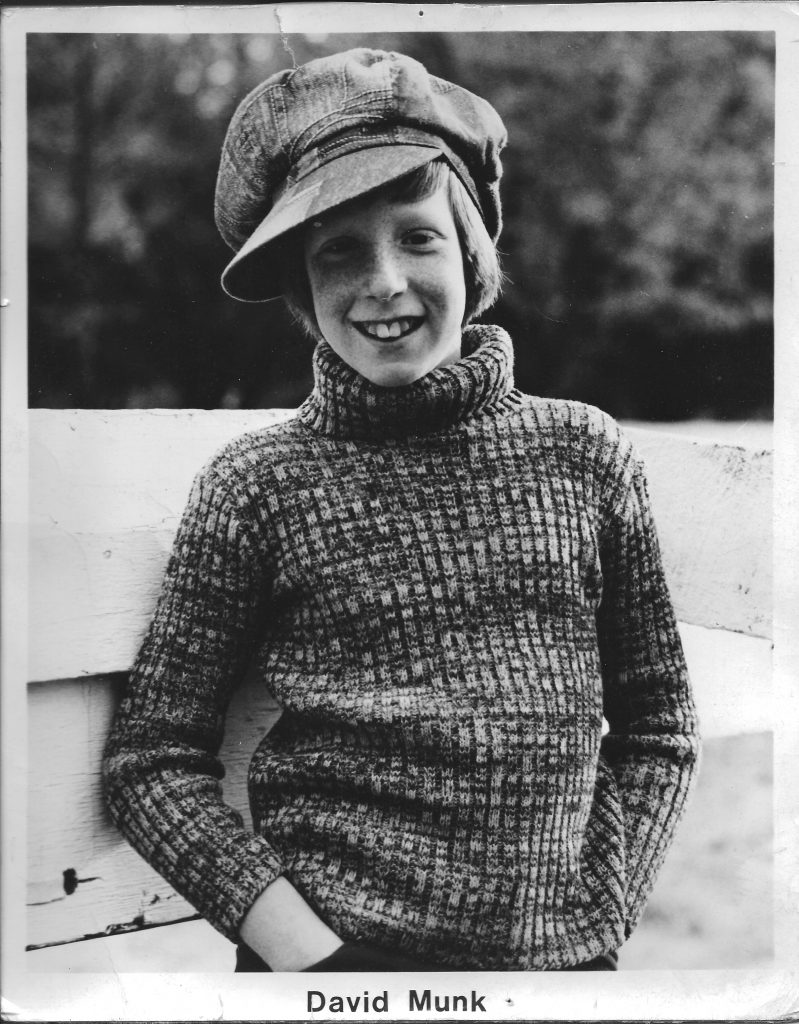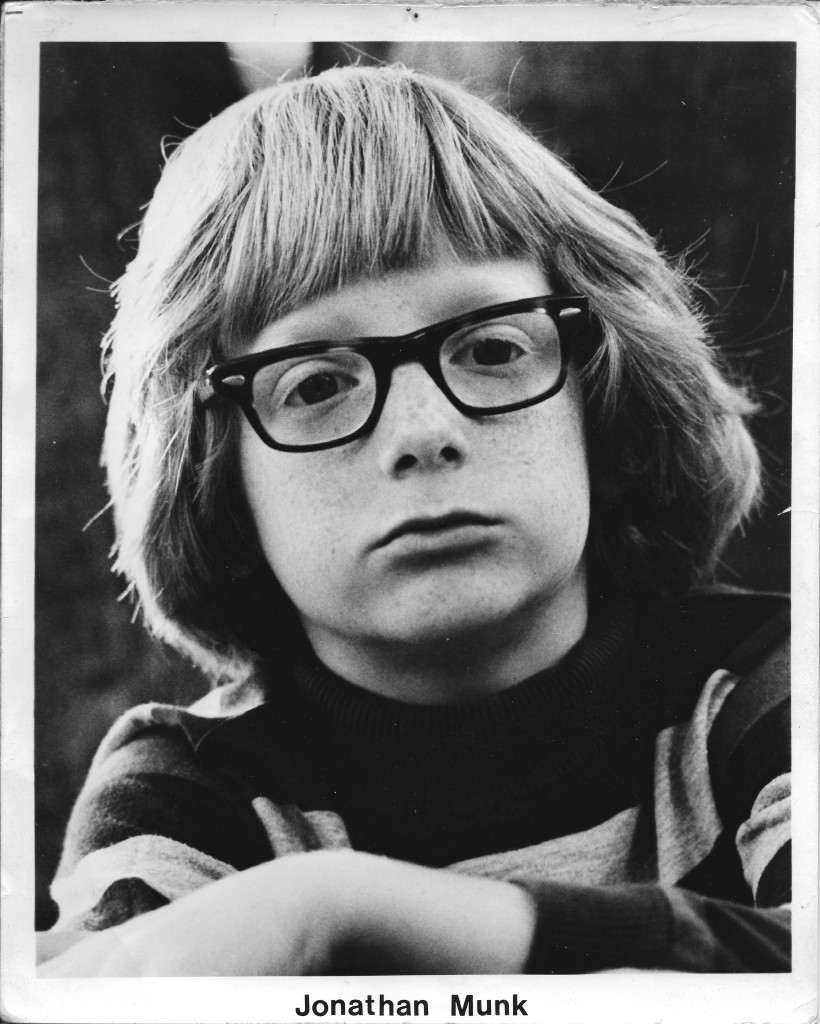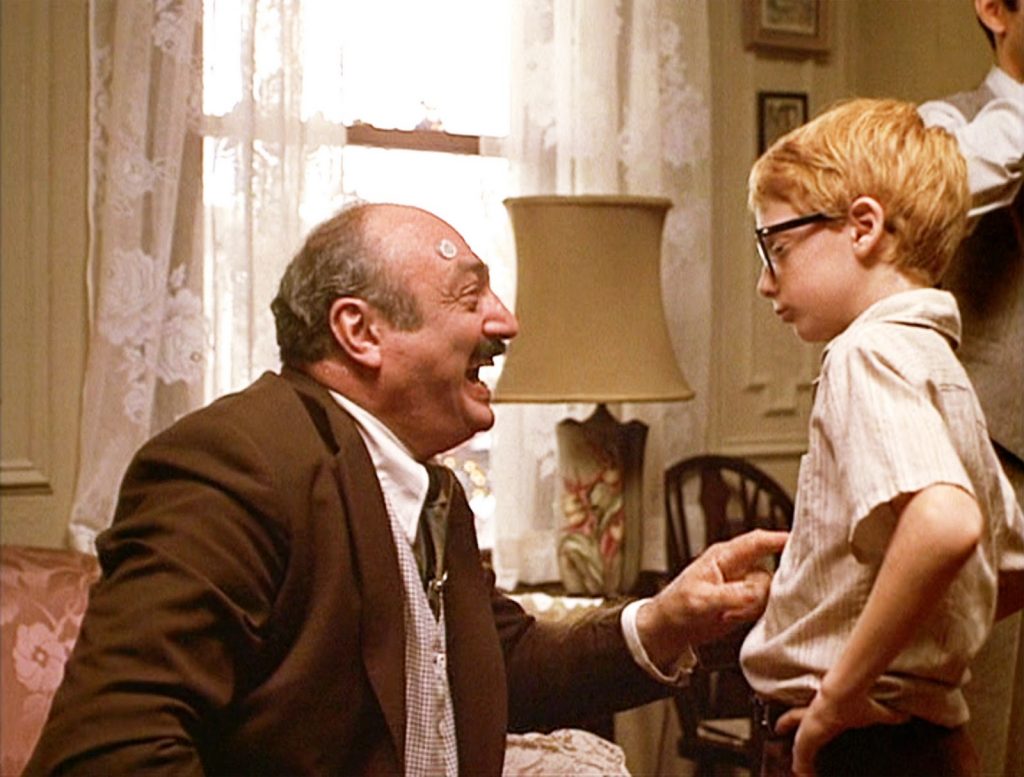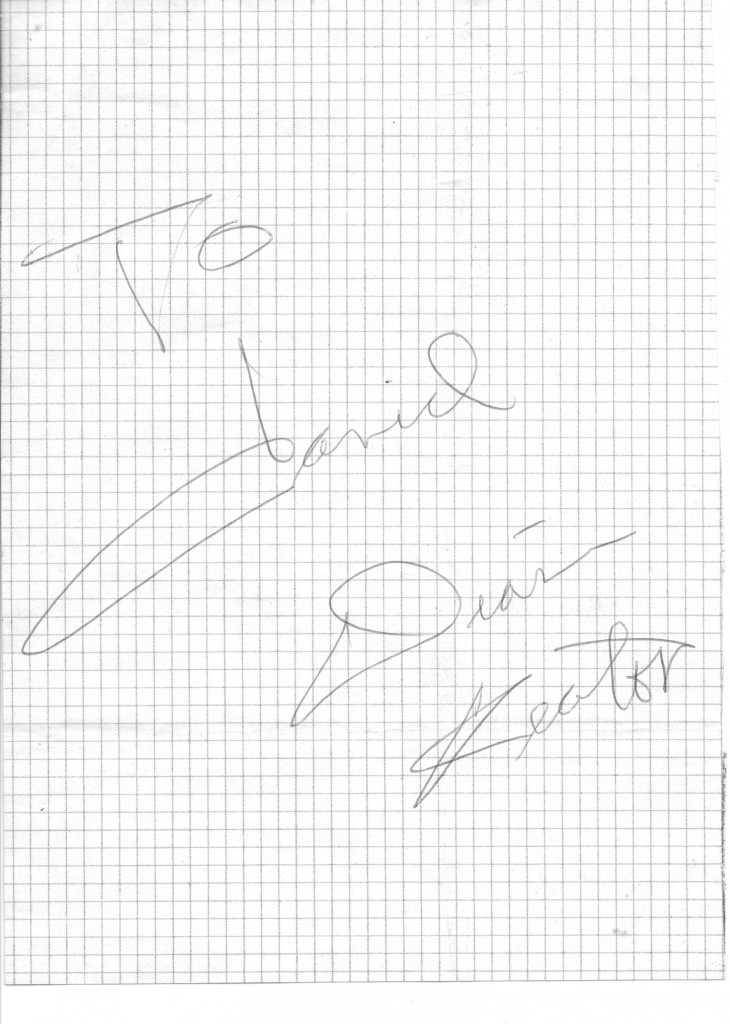In 1973, my two younger brothers and I became professional actors. Though I was only nine, I regarded the arrival of my Screen Actor’s Guild card as the logical first step toward the realization of my then three-year-old “life-long dream”: to be a famous actor. My brothers were typical suburban kids who liked sports and bugs and utterly indifferent to the opportunity presented to us. To me it was everything: a bromide for relentless bullying and, potentially, a method to curtail a thorny childhood and fast track to the big time. Though only nine, I did, in fact, think in mid-century theater parlance, so the concept of the “big time” was very much on my mind.

As I discovered in short order, Jonathan, my middle brother, was the most marketable because he was a “regular sports-playing, bug-catching boy.” For the first few years, despite my oversize ambition, I was pretty hard to cast because my interests and countenance leaned less toward average suburban kid and decidedly more toward pint-sized, effeminate, vaudevillian. My youngest brother Robbie was only four and somewhat introverted at first, so he sat on the sidelines like me, but without the angst. Jonathan unwittingly booked the first commercial audition he got, a spot for Stouffer’s crumb cake; and he continued to get work with depressing regularity. I grew increasingly envious and bewildered. By 1975, matters got even worse when he was cast as the star of an entire Marx Toys campaign that was based on the Our Gang comedy shorts. Suddenly, my indifferent brother became an overnight local celebrity as a result of the Marx Toys multi-product assault on Saturday morning TV, which included a commercial for the biggest toy on the market—the Big Wheel.
With Jonathan’s public recognition throughout suburban East Brunswick, I became more despairing than at any time since he was born (when my mother brought him home from the hospital, apparently I asked her to “throw him out with the garbage.”) I bemoaned the strange order of the universe that appeared to be meting out my lifelong dream in delicious, bite-sized increments, but to the wrong person. Perhaps out of necessity, I fomented an idea that would rectify the cosmic mistake that I ruminated about with increasing regularity: I would respond to the commercial industry’s clear preference for my brother by reframing his success as a family business. In so doing, I could avail myself to any small pieces of fruit that fell off Jonathan’s tree while I madly circled below with a giant basket woven from my desperate need for attention. Thus, any success he experienced conferred something on me, even if the light was not quite as hot as I’d wished it were. For extra insurance, I decided to produce, direct, and star in a full-scale drag production of the Cher TV show in our basement and threw myself into rehearsals, marshaling neighborhood kids who were much easier to control than recalcitrant Manhattan casting directors. But no amount of psychological brinksmanship could prepare me for what came next.

In the autumn of 1975 as my excitement for my drag debut grew, our manager called with her familiar greeting, “Hi David, it’s Dolores, I’ve got a call. This is a big one!” As I daydreamed about whether to do “Gypsies, Tramps, and Thieves” or “Half-Breed” in my second solo spot, she added, “It’s for a movie, David,” at which point I quickly snapped out of my Cher reverie right back to the reality of our canary yellow and brown kitchen. “Really?” I gulped, “Is it for…me?” “No, sweetie, it’s for Jonathan,” she replied in her smoker’s husk, a sound I both feared because it never said what I wanted it to and loved because it had the power to change my life. “It’s a Woody Allen movie. Do you know who he is? He’s a very famous comedian. The movie doesn’t have a name yet, but it’s a featured part—he would play Woody Allen as a kid. He has to be at Juliet Taylor Casting and he has to be on time” “Of course he’ll be on time,” I answered, before hanging up the phone and returning to script I was writing on my mother’s 1940s Corona typewriter.
“Did I know who Woody Allen was?” I said out loud as I angrily banged the keys. Next to What’s Up, Doc? and The Out-of-Towners, Sleeper was my favorite movie ever and I was obsessed with Diane Keaton and her dynamic on-screen chemistry with Woody; I was livid. When Jonathan walked in a few minutes later, I shared the news in as pleasant a tone that was then-available, all the while banging out letters with all of the intensity my eleven-year-old index finger could muster. I explained to my ungrateful brother that he would have to forego another afternoon of freedom to commute forty minutes to Manhattan for this audition. Difficult in his apathy as always, I tried to explain this was our his big break.

Jonathan did meet Juliet Taylor the next day and impressed the legendary casting director. He was called back to meet Woody a few days later, when he handily won the role of Little Alvy Singer, putting him once again in the position he inadvertently found himself in time and time again: victor. Winning the role certainly had something to do with luck, but I think it had a great deal more to do with the fact that in looks, personality, and bearing, my brother essentially was a small version of Woody Allen, from the wacky jokes right down to the tortoise eyeglass frames which, by coincidence, he’d always worn—not to get a part as Woody Allen, age nine—but to see! It just so happens that comical little red headed boys who wore glasses and play baseball were more marketable than effeminate little red-headed boys who lip synched to Gypsies, Tramps and Thieves in the basement. What I lacked in marketability I made up in authenticity, which, though not often lucrative, has a certain aspect that seems at least noble and true.

There was actually not a single contrived element to Jonathan getting the role it was, simply “bashert”—meant to be. As Jonathan began the process with costume fittings and such, I pumped him for details and any scrap of information. He remained as dispassionately vague as ever and I glumly began what I refer to as “my period of adjustment,” wherein I tried to yield to the inevitability of Jonathan having a starring role in a film without the life experience that I would have found useful when brooking such a betrayal of fate. On the plus side, I didn’t have to countenance a sibling who was at all invested in his own good fortune and its concomitant preening that would, no doubt, have made this challenge insurmountable. His complete indifference to his good fortune made dealing with it a great deal easier for me, which is about the best that can be said when your seven-year-old brother snatches your dream: at least he didn’t mean to.
Jonathan began shooting Annie Hall in the early spring of 1976. My parents, now divorced, would take turns bringing him to the city for the shooting days and I could at least count on them to give me detailed accounts of every scene. Always being extremely interested in history—especially the way the past looked and sounded—I was excited that all of Jonathan’s scenes were flashbacks, set in the 1940s—which required him to sport a short hair cut for the first time in his life. It was like he was transported to another era. Even at that age I was nostalgically drawn to any representation of the past. The fact that Woody was essentially expressing my own family’s history, Jews in Brooklyn in the 1940s, only made it all the more intriguing. It must have been interesting for my parents to see their child inhabiting their childhoods in Brooklyn.

My father took Jonathan to set the day they shot the Coney Island scenes and recounted how, in typical Jonathan fashion, he managed to drive the bumper car in the wrong direction. Dad doesn’t remember this now, but I clearly do. Another day, mom told me in detail about the doctor’s office scene—now extremely famous—where my brother’s character is chastised for not doing his homework because of his fear that the universe is expanding. “What’s the point?” he asks despondently, to which Joan Newman, the actress playing his mother, responds in exasperation, “What has the universe got to do with it? You’re here in Brooklyn! Brooklyn is not expanding!”

Little Alvy Singer ended up in several of the film’s most memorable scenes, including the interior shots of Jonathan eating a bowl of soup in the house under the roller coaster (the exterior was the Kensington Hotel which was actually located under the Thunderbolt roller coaster and demolished in 2000: the interior was a set), and, perhaps most famously, the scene where Little Alvy’s uncle, “Joey Nickels,” does the bit pinching his cheeks and telling him he can always remember his name, “Just remember, ‘Joey five cents,'” and my brother walks away muttering “what an asshole,” a line that always got one of the biggest laughs in the film.

What is not well-known is that a pre-Pretty Baby Brooke Shields was cast as Judy Horowitz, my brother’s love interest in the film. Several scenes featuring Jonathan and Brooke were shot, including a Thanksgiving Day-themed school play scene that was filmed at the St. Bernard School on West 13th Street in Greenwich Village. In it, Jonathan plays a pilgrim locked in a stockade while he drools over the stunning Shields, unable to speak or move. It would appear that she was also a part of the classroom scene, based on the still photo below. All of their scenes were unused and are lost to time. Jonathan struck up a friendship on the set with eleven-year-old Brooke and came home one day from shooting with an autographed picture—a composite of different portraits by Francesco Scavullo.


Both Jonathan and I were smitten with Brooke—who wasn’t? When Brooke invited Jonathan to her twelfth birthday party at a swim club in Ossining, I had to console myself with saying a quick “hello, happy birthday,” when we picked him up to take him home—another piece of low-hanging fruit. When I asked him if he remembered that day, surprisingly, Jonathan did, recounting for me that not knowing how to swim, he awkwardly sat on the side of the pool for the duration of the party watching the rest of the kids at play and staring at the birthday girl: in a sense, a reiteration of their stockade scene. When we got there to collect my brother, I can still picture Brooke coming out of the pool to say goodbye to him with kisses and effusive gratitude for coming, while I stood there like a stage door Johnny hoping to make eye contact with the young beauty. Even then—especially then—it was obvious that Brooke Shields was something absolutely extraordinary. Jonathan added that he thought she was extremely smart, kind and remarkably unaffected considering that she had won the genetic lottery and been a professional model since she was an infant. It was obvious to me she was headed for the big time.


After much hectoring, my mother agreed to let me skip school one day and accompany Jonathan to the set, a day I remember extremely well. The scene they shot was part of the montage where Woody, Diane Keaton, and Tony Roberts were looking back at his childhood. Shot on location in Brooklyn, the scene, eventually cut from the film, was, nonetheless, quite funny. It showed my brother playing basketball and stopping mid-dribble to whip out a thermometer to take his temperature. Though I was just an observer, I loved watching the crew and the actors and absorbing every single detail of film production and its wonderful sense of community as everyone did their unique job. Though most people find film sets dreadfully boring, I never did. To me they were riveting—the complex process of creating the illusion of reality—reel life, was much preferable to the sometimes mundane ,sometimes painful day-to-day experience of my real life. I’m certain that it was these early experiences on film sets that inculcated the idea of becoming a film student later on.
I adored the great Diane Keaton—still do—and the highlight of that day was driving back to Manhattan in the same van with my chaperone, my brother, and the actress, in whose presence I found myself, perhaps for the first time, starstruck and so nervous I barely spoke. I did however, emerge with a small souvenir of my first big-time celebrity encounter:

Even before Jonathan finished shooting the film, word spread through East Brunswick that the town was harboring a budding movie star. Kids at school started asking questions and I became practiced at responding. Though I grew weary of always saying, “No, that’s my brother,” when asked about the film, it was obvious that even being the brother of someone “important” conferred certain advantages and mysteriously worked as a buffer against my ever-present social challenges: apparently even bullies get starstruck.

Upon its release in April 1977, the film quickly became a critical and financial success of rather astonishing proportion, ultimately winning Academy Awards for Best Actress, Best Original Screenplay, Best Director, and, of course, Best Picture, one of the very few comedies in history to do so. Even more importantly, the film became a cultural reference point, sparked a fashion craze with Keaton’s “Annie Hall” look and, in the end, became one of the defining films of 1970s.

In a strange twist, today Jonathan has very few memories of actually making the film or its effect on our lives, while I can account for every piece of fruit I accumulated in my little basket, no matter how small, with perfect recall and no lingering resentment. My brother relies on me to a certain extent to remind him of his experience making Annie Hall, which begs the question: if one person remembers an event and another has no memory, in the final analysis, to whom does the experience belong? In our case, I suppose it’s just something Jonathan and I ended up sharing; it was his because it happened to him, but it was also mine because I was able to remember it and keep it someplace very safe. Today, the whole “Annie Hall” thing is really something that bonds us, a memory Jonathan has virtually no ego invested in and something he freely shares. After all these years, he still would rather be doing something else.






Michele
June 26, 2012 at 2:13 pmDavid, I loved this piece. Your writing is spectacular and evokes emotion in every line. My heart hurts for you not having lived your dreams. But I’m totally uplifted knowing that it didn’t interfere with your relationship with Jon. Sending you a huge hug and so much gratitude for being able to share these little bits of your (his)story.
Do you remember (of course you do) the summer you were 12 and spent a week with me in Beacon, mostly watching the Olympics?
David Munk
June 26, 2012 at 2:34 pmOf course I remember that week. It was the Nadia Comenici Olympics! I remember that week clearly. It was the first time I ever saw a microwave oven (you were so progressive!), I hung out in the store and Uncle Seymour gave me a book about Frank Sinatra that I still have and the song on the radio was “Afternoon Delight” by the Starland Vocal Band. How’s that for memory? But please, don’t ask me what I ate for lunch, I couldn’t tell you!
mitch blum
July 6, 2012 at 5:44 pmWow, that is a great piece of wriing material. I love it…if you are around in the city next week, I would love to catch up with you. I will be around from Thurs – Sun 15th.
I can drop by the store…
Mitch
David Munk
July 6, 2012 at 8:59 pmHi Mitch
Unfortunately the store closed late last year. I will be in and out next week of the city. Let me know on FB what days you are going to be there and maybe we can grab a cup of coffee or a drink depending on scheduling. Thanks for reading my work! David
Gale Wernli
September 10, 2012 at 12:07 amI just want to tell you that I am new to blogs and absolutely enjoyed your page. Almost certainly I’m planning to bookmark your blog . You amazingly come with exceptional articles. Thanks a bunch for sharing your website.
KK
August 2, 2015 at 3:20 pmHi David- My obsession with old Hollywood comes and goes. This time, when it came, I googled something and found you. What a great find! That was about a week ago. Since then I’ve read dozens of your blog posts. Last night I stumbled upon the Honeycomb Hideout series. Loved it! But I can’t find part five. Did you write it?
Thank you for sharing all of these stories. Such variety. They scratch many of my itches:)
David Munk
August 2, 2015 at 6:05 pmHi KK,
Always glad to scratch an itch! I never wrote volume five because I realized I was actually writing a memoir so I began to hold back those pieces for the book. Knowing that you responded to them is terrific encouragement that I’m on the right track. Thanks for Stargayzing with me.
David
Brendan
October 6, 2019 at 6:54 pmHi David. Stumbled across your blog while researching a script I’m writing. Great post. Out of curiosity, did your brothers continue acting?
David Munk
December 13, 2019 at 8:57 pmNo, they didn’t but also didn’t really want to. Rob works in advertising and Jonathan is a poet. What is your book about, if I may ask?